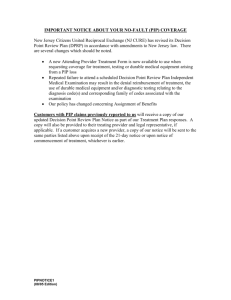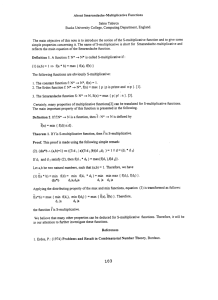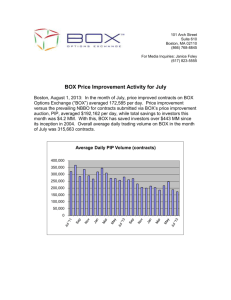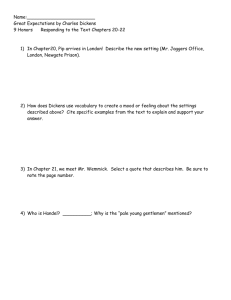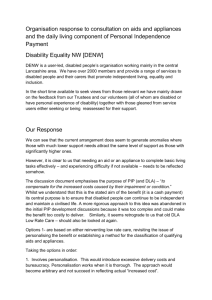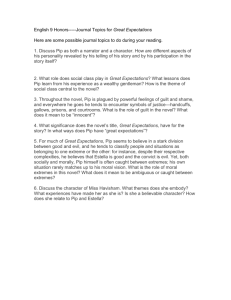Fundraising brochure
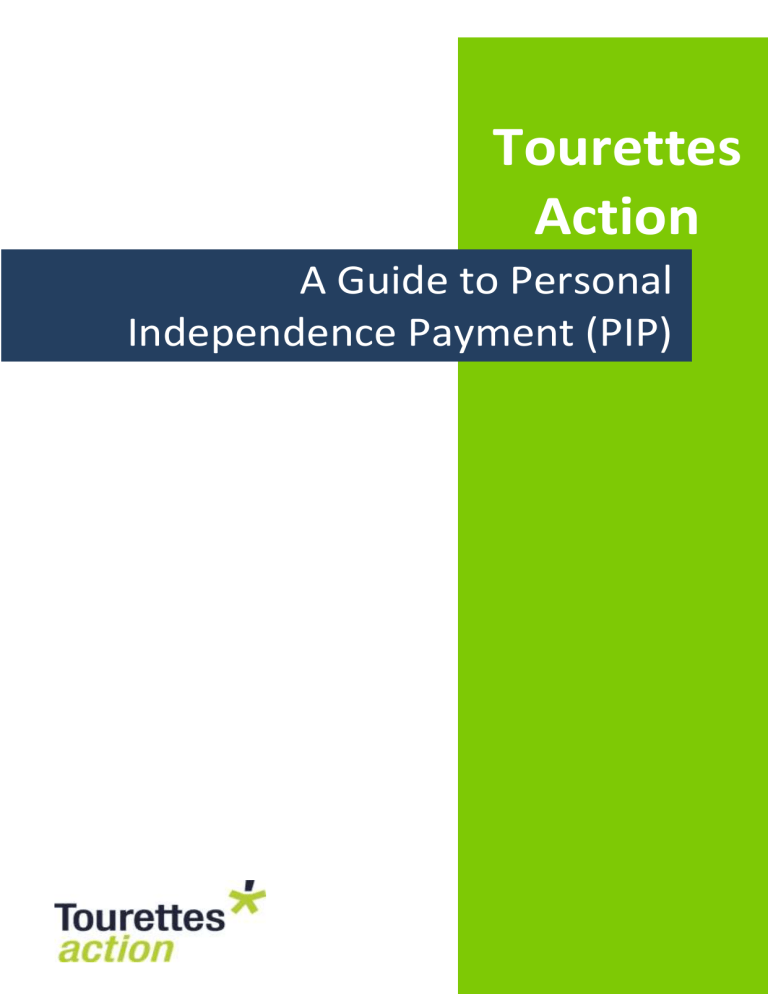
Tourettes
Action
A Guide to Personal
Independence Payment (PIP)
Source: Benefit
Page | 2
Personal Independence Payment (PIP) is a disability benefit replacing Disability Living
Allowance (DLA) for working age claimants (age16-64) from April 2013.
PIP is intended to help towards some of the extra costs arising from a long term ill-health condition or disability and is based on how a person’s condition affects them, not the condition they have.
It is not means-tested or subject to tax and it is payable to people who are both in and out of work.
This guide provides general information about claiming Personal Independence Payment, and has been sourced from benefits information provider: ‘Benefits and Work’.
A list of organisations can be found at the end of this document, which can provide detailed information and advice on benefits.
Contents
PIP vs. DLA Similarities and Differences
Timetable for Introduction to PIP.
How to make a claim for PIP.
Attending a medical
Completing activities reliable
Collecting supporting evidence
Completing the form – tips and key points
Organisations to help with benefit information, claims and appeals
6
7
8
4
5
3
3
5
Website: www.tourettesaction.org.uk Email: help@tourettes-action.org.uk Call: 0300 777 8427
Tourettes Action, , The Meads Business Centre, 19 Kingsmead, Farnborough, Hants, GU14 7SR Registered Charity number: 1003317
Source: Benefit
Page | 3
PIP vs. DLA – similarities and differences
Similarities Differences
Like DLA, PIP is not means tested, doesn’t require national insurance contributions, can be claimed whether you are working or not, is non-taxable and acts as a passport to other benefits and premiums.
Unlike DLA, each component has only two rates, a lower paying standard rate, and a higher paying enhanced rate – DLA has three rates to the care component.
Like DLA, PIP is divided into two components: a daily living component and a mobility component.
Unlike DLA, PIP awards are based on a points system, meaning that the method of assessment has more in common with employment and support allowance (ESA) than with DLA
Like DLA, PIP can give some claimants access to Motability scheme and automatic entitlement to a Blue Badge.
Unlike DLA, the vast majority of awards are intended to be time limited – the majority will be for either two years or five years. So most PIP claimants can expect to have regular reassessments for as long as they remain on benefit.
Like DLA, people who qualify for the benefit below the age of 65 can continue receiving it beyond 65 provided they still meet the eligibility conditions.
Getting an award for PIP can ‘passport’ you to entitlement to other benefits or additional amounts of other benefits. The
DWP have said that it is their intention that passporting for PIP should mirror DLA.
Timetable for introduction of PIP
The transfer of claimants from DLA to PIP is expected to take 5 years, ending in March 2018.
People already receiving DLA will be contacted by the Department for Work and Pensions
(DWP) and advised to make a claim for PIP.
The DWP have published a timetable for the transfer which has been set out below:
From April 2013 - The new timetable begins with a pilot from 8 th April 2013 for new claims to PIP in the North West and part of the North East of England.
From June 2013 - From June 2013, all new claims from anyone aged 16-64 will be for
PIP instead of DLA throughout the whole of Great Britain
Website: www.tourettesaction.org.uk Email: help@tourettes-action.org.uk Call: 0300 777 8427
Tourettes Action, , The Meads Business Centre, 19 Kingsmead, Farnborough, Hants, GU14 7SR Registered Charity number: 1003317
Source: Benefit
Page | 4
From October 2013 - From 7 October 2013 the following DLA recipients will begin to have to claim PIP
Children turning 16 will have to claim PIP when their existing fixed term award is coming to an end.
People reporting changes of circumstances which might affect their rate of payment, such as an improvement or deterioration in their condition, but not issues like going into hospital or changing address.
People with a fixed DLA award which expires from the end of February 2014.
From October 2015
From October 2015, all other working age DLA recipients will have to make a claim for PIP.
Claimants will be selected randomly from the DWP database and contacted accordingly.
How to make a claim for PIP
1. Initial claim form
Initial claim forms collect basic information about you, and are usually completed over the telephone. If speaking on the telephone is difficult for you, you can request a paper claim form (PIP1) to fill out instead.
You can download a copy of the PIP1 form from the DWP website:
2. ‘How your disability affects you’ form
Following the initial claim, most people will be sent a ‘How your disability affects you’ form to complete.
This form collects details about your health condition and how your disability affects you.
You will be asked to give details based on specific questions relating to your daily living activities and mobility.
You are also encouraged to send supporting evidence such as supporting letters from your consultant and/or other health professionals, as well as non-medical evidence such as a letter from your social worker or friend, who helps you carry out everyday activities.
The more relevant evidence you can submit to support your claim, the better the chances of getting the right decision.
You can collect supporting medical and non-medical evidence to support your claim; or rely on Atos or Capita to send for additional evidence. However, it is not automatic that Atos and
Capita will ask for supporting evidence from your chosen health professionals, so you therefore may wish to collect and submit medical evidence yourself.
Whether or not you decide to obtain medical evidence yourself, you can still talk to your health professionals to let them know you are claiming or being transferred to PIP, and update them about how your condition is affecting your everyday activities.
Website: www.tourettesaction.org.uk Email: help@tourettes-action.org.uk Call: 0300 777 8427
Tourettes Action, , The Meads Business Centre, 19 Kingsmead, Farnborough, Hants, GU14 7SR Registered Charity number: 1003317
Source: Benefit
Page | 5
You can download a copy of the ‘How your disability affects you’ form and accompanying booklet from the DWP website at:
Attending a medical
Atos and Capita are companies that have been appointed by the government to carry out
PIP medicals. Not everybody will be required to attend face to face medicals. However, if it is felt by the health professional assessing your claim that further evidence is needed, you may be asked to attend a medical.
Atos and Capita operate in specific areas throughout the UK:
Atos
Scotland
NE England
NW England
Isle of Man
London
Southern England
Capita
Wales
Central England
Assessments will either be carried out at home, examination centres or mobile assessment centres. You are allowed to have somebody with you during the medical such as a relative or friend if you wish to.
Many people feel anxious about one to one medicals. If having a friend or relative at the medical will help to put you at ease, try to organise this for yourself.
Try to keep a positive outlook on the assessment. It is not always easy – especially with a fluctuating condition such as Tourette Syndrome – to convey on a form, the impact it has on your everyday activities. A medical assessment can be seen as an opportunity to communicate effectively the impact your condition has on you.
Once an assessment has been made, a decision maker should consider all the evidence available to them, including the Atos or Capita health professional’s report, to reach their own conclusion about how many points you should be awarded for each component; which will determine whether you are eligible for an award of PIP.
Completing activities reliably
The most important word to remember in relation to every question on daily living and mobility activities on the ‘how your disability affects you’ form is the word: reliably
Guidance issued by the DWP states that you need to be able to complete an activity
‘reliably’ in order for it to apply. According to the guidance, ‘reliably’ means whether you can do so:
Safely – in a fashion unlikely to cause harm to themselves or to another person
To a necessary and appropriate standard – given the nature of the activity
Repeatedly – as often as is reasonably required
In a timely manner – in a reasonable time period
Website: www.tourettesaction.org.uk Email: help@tourettes-action.org.uk Call: 0300 777 8427
Tourettes Action, , The Meads Business Centre, 19 Kingsmead, Farnborough, Hants, GU14 7SR Registered Charity number: 1003317
Source: Benefit
Page | 6
The DWP guidance also states that ‘pain, fatigue, breathlessness, nausea and motivation’ will all be ‘key factors’ in deciding whether an activity can be done reliably.
So for each question on daily living and mobility activities, consider whether or not you can carry out each descriptor reliably – using the definition of reliably as provided by the DWP for your reference.
Scoring points when you have a fluctuating condition
Tourette Syndrome is a fluctuating condition and a person’s needs are likely to change over time. When claiming PIP, each condition is assessed as it is likely to be over the course of 12 months.
Each question includes different descriptors, to help specify the degree to which your disability impacts your ability to carry out that particular activity reliably. To help you work out the descriptor which is most applicable to you, you need to decide on the descriptor that applies to you for the majority of the time.
According to the DWP, unlike DLA, you don’t have to satisfy a descriptor for most of the day for it to apply on that day. Guidance issued by the DWP explains that:
“If a descriptor applies at any point during a 24 hour period, it is considered to apply for the entire day, whereas in DLA it would have to apply for ‘the majority of the day’ in order to apply”.
Collecting supporting evidence
Always try to arrange to have letters sent to you rather than direct to the DWP so that you can make copies of the original letters and centralise all paperwork before you send it to the
DWP.
Medical evidence from your GP
Supporting letters form GPs will need to be requested; GPs are not under any obligation to provide supporting letters to patients claiming for PIP.
Medical evidence from health professionals other than your GP
This can include letters from your consultant, specialist nurse, occupational therapist or any other health professional you see.
Where possible, see if you can make an appointment with your health professional to discuss the impact of your condition on your everyday life and the kind of evidence you would like them to provide to support your claim.
Health professionals are not under any duty to provide you with supporting letters, so unfortunately they are within their rights to refuse or to ask for money.
Medical records
You can ask your GP or hospital for copies of either all your medical records or for records that are relevant to your claim. You may be charged for copies.
Website: www.tourettesaction.org.uk Email: help@tourettes-action.org.uk Call: 0300 777 8427
Tourettes Action, , The Meads Business Centre, 19 Kingsmead, Farnborough, Hants, GU14 7SR Registered Charity number: 1003317
Source: Benefit
Page | 7
Non-medical evidence
You can ask people in your life to provide detailed evidence of how your condition impacts your everyday life. This could include relatives, friends, carers, support workers, social workers and housing workers.
Appealing your PIP decision
The law relating to appeals changed from April 2013. From that date it is no longer possible to go straight to appeal against most benefits decisions, including PIP. Instead, if you are not happy with the decision you can apply for it to be looked at again – a reconsideration – and then, if you are still not happy, you can appeal. The reconsideration will normally be carried out by a different decision maker.
A reconsideration should be requested within one month of the date of the letter giving
you the decision.
It is advised that you get help if you wish to challenge a decision. You can download a guide to revisions and appeals from the benefits and work website: www.benefitsand work.co.uk
Completing the form – tips and key points
Complete the form in as much detail as you can. This is your opportunity to give a detailed and accurate explanation of how your condition affects you in relation to the points scoring activities.
Give good examples of the problems that you have encountered.
It might help to keep a diary to refer to when you are completing the form. Diaries also help to see how time adds up over a week.
Make sure you mention everything about any associated disorders that you might have, such as OCD and ADHD.
If you need to write on additional sheets, make sure you include your name and national insurance number on the top of every additional sheet you use and, if possible, staple them to the back of the questionnaire.
Keep copies of all the paperwork you send in so that you have references for the future, and have records for if /when you need to re-apply, or any paperwork gets lost by the DWP.
Website: www.tourettesaction.org.uk Email: help@tourettes-action.org.uk Call: 0300 777 8427
Tourettes Action, , The Meads Business Centre, 19 Kingsmead, Farnborough, Hants, GU14 7SR Registered Charity number: 1003317
Source: Benefit
Page | 8
Organisations to help with benefit information, claims and appeals
Advice Northern Ireland To find your local independent advice centre in Northern Ireland, visit www.adviceni.net
Benefits and Work are an independent organisation who provide information about disability and incapacity benefits. Useful information can be accessed on their website, however they are funded by their members so a lot of information can only be obtained with membership: http://www.benefitsandwork.co.uk/
Citizens Advice Bureau provide information and advice on benefits through their local offices and website: www.citizensadvice.org.uk
Citizens Advice Scotland: www.cas.org.uk
Contact A Family provides information of all the main benefits and tax credits available, focusing on those aspects which most affect families with disabled children. www.cafamily.org.uk
Disability Information Advice Line There are over 140 local DIALs all staffed by disabled people and all offering telephone advice. If you have a local line it should be listed in your telephone directory under DIAL UK. Alternatively, call the national office on 01302 310 123 or visit their website at www.dialuk.org.uk
Disability Rights UK is an organisation led, run and controlled by disabled people; offering information and advice on benefits: http://www.disabilityrightsuk.org/index.htm
Law Centres: Contact details of your nearest Law Centre, where you may be able to get free advice and representation at appeals, are available from the Law Centres Federation website at www.lawcentres.org.uk
Shelter offers help with benefits, but generally only in relation to housing or if your home is at risk because of your benefits problems. Shelter helpline 0808 800 4444 or visit their website: www.shelter.org.uk
Turn2us helps people in financial need gain access to welfare benefits, charitable grants and other financial help – online, by phone and face to face through their partner organisations.
They have an online Benefits checker: http://www.turn2us.org.uk/default.aspx
Your Local Authority may employ Welfare Rights Workers who can help with your claim.
Website: www.tourettesaction.org.uk Email: help@tourettes-action.org.uk Call: 0300 777 8427
Tourettes Action, , The Meads Business Centre, 19 Kingsmead, Farnborough, Hants, GU14 7SR Registered Charity number: 1003317
